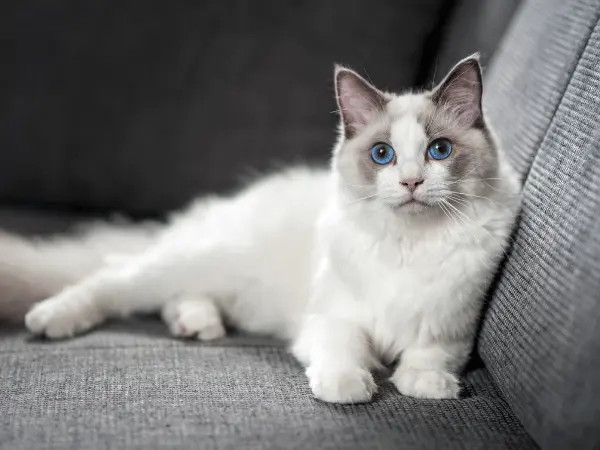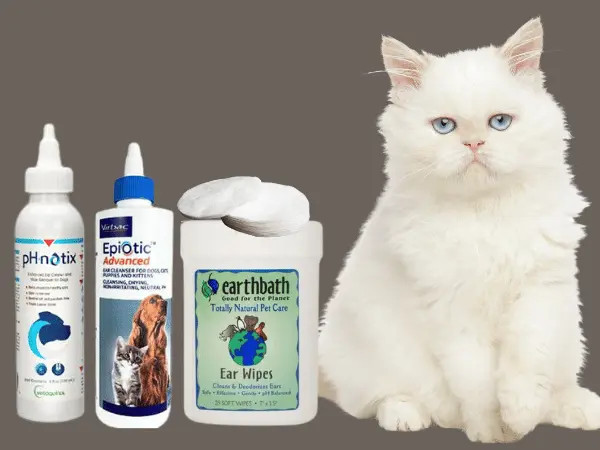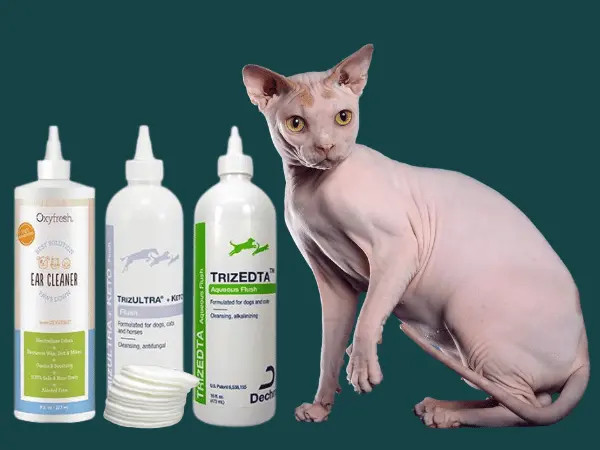Cats are known for their meticulous grooming habits, but sometimes they need a little help, especially when it comes to their ears. While routine ear cleaning isn’t always necessary for cats, there are instances where a Cat Ear Cleaner or ear wash for cats becomes essential. This vet-approved guide will walk you through everything you need to know about cat ear cleaners, including when and how to use them safely and effectively. We’ll also explore the best cat ear cleaners available and answer your most frequently asked questions to ensure your feline friend’s ears stay healthy and happy.
 A healthy cat with well-maintained ears using cat ear cleaner or earwash for cats
A healthy cat with well-maintained ears using cat ear cleaner or earwash for cats
Alt text: A serene ginger cat enjoys a gentle ear cleaning with a vet-recommended cat ear cleaner, highlighting the importance of feline ear hygiene.
When is Cat Ear Cleaning Necessary? Recognizing the Signs
Overdoing ear cleaning can irritate your cat’s delicate ears, which is why it’s not a standard part of their grooming routine. However, certain situations call for a closer look and potential cleaning. If you notice any of the following signs, it might be time to consider using a cat ear cleaner, and consulting with your veterinarian is always a wise first step.
1. Earwax Buildup in Cats: A Common Indicator
Keep an eye out for light brown earwax accumulating in the outer part of your cat’s ear. This is a clear signal that they might need assistance with ear cleaning. Excessive earwax production can also be triggered by cat allergies. Furthermore, some cat breeds are naturally more prone to earwax buildup. Sphynx cats and brachycephalic breeds like Persian and Himalayan cats are particularly susceptible. Regular checks can help you identify buildup early.
2. Ear Irritation or Itchiness: Responding to Discomfort
Various factors can cause your cat’s ears to become irritated or itchy. These can range from excess earwax and ear infections to foreign objects lodged in the ear canal. If your cat is experiencing ear discomfort, you might observe excessive scratching around the ears, frequent head shaking, tilting their head to one side, or redness due to persistent scratching. These behaviors are strong indicators that something is amiss and warrants attention.
3. Ear Infections in Cats: Addressing Potential Issues
While less prevalent in cats compared to dogs, ear infections can still occur, especially if a cat has existing earwax buildup, a weakened immune system, allergies, or diabetes. Ear infections in cats can be caused by various culprits, including ear mites, bacteria, or yeast. Key signs of an ear infection in cats include itchy ears, discharge from the ears (which may be odorous), dark debris resembling coffee grounds, and visible inflammation within the ear canal. Prompt veterinary attention is crucial if you suspect an ear infection.
Choosing the Right Cat Ear Cleaner: Non-Medicated vs. Medicated Options
For general cleaning to remove excess earwax, non-medicated cat ear cleaners are typically recommended. A vet-approved, high-quality ear cleaner is specifically formulated to be gentle and non-irritating while effectively breaking down solidified earwax within your cat’s ear canal.
On the other hand, medicated cat ear cleaners are designed for specific issues, primarily active bacterial, fungal, or ear mite infections.
Important Caution: It’s crucial to AVOID using solutions like alcohol, hydrogen peroxide, plain water, homemade ear cleaners, and ear cleaners formulated for other animals. These substances can be harmful and cause significant discomfort to cats. Cotton swabs (Q-tips) are also a definite NO; they can push debris further into the ear canal and potentially damage the eardrum.
Why Water is Not Suitable for Cleaning Cat Ears
Plain water is NOT a safe or effective option for cleaning your cat’s ears. Regardless of its form – distilled, tap, or mineral water – it is not recommended because it can easily get trapped in a cat’s ear canal. Trapped water can lead to discomfort and, more importantly, create a moist environment that encourages the growth of yeast or bacteria, potentially leading to infections.
 A healthy cat with well-maintained ears using earwash for cats or cat ear cleaners
A healthy cat with well-maintained ears using earwash for cats or cat ear cleaners
Alt text: A contented tabby cat receives ear care with a specialized cat ear wash, emphasizing the proper way to maintain feline ear health using appropriate products.
Top Non-Medicated Cat Ear Cleaners: Gentle and Effective Options
The following cat ear cleaners are commonly used to safely flush out excess or solidified earwax when necessary. These ear washes for cats are formulated with gentle yet effective ingredients that are generally well-tolerated by most cats. However, it’s always best to consult with your veterinarian before introducing any new product into your cat’s care routine.
Veterinary Insight: Sploot Veterinarian Dr. Sylvia Berns advises against using cat ear cleaners containing steroids like hydrocortisone without direct veterinary guidance. These ingredients can worsen bacterial or yeast infections, especially in ear washes that lack antibacterial or antifungal components.
1. Epi-Otic® Advanced Ear Cleanser: For Regular Use
Epi-Otic® Advanced Ear Cleanser is designed for routine ear cleaning in cats. It boasts a neutral pH and is formulated to minimize stinging, ensuring a comfortable experience for your feline companion. Additionally, it aids in reducing inflammation within the ear canal.
2. pH-Notix Enhanced Ear Cleaner: Breaking Down Earwax
PH-Notix Enhanced Ear Cleaner is specifically formulated to effectively break down solidified earwax buildup. It contains ingredients that emulsify debris, making it easier to flush out of your cat’s ears. Its oil-free formula also soothes and moisturizes the sensitive ear canal, promoting a healthy natural barrier. Furthermore, this ear wash for cats includes proprietary “lipacides” to help minimize future earwax accumulation.
3. Earthbath Ear Wipes for Cats & Dogs: Convenient Ear Flap Cleaning
While cat ear cleaners in liquid form are ideal for cleaning the ear canal, Earthbath Ear Wipes for Cats & Dogs offer a convenient solution for cleaning your cat’s outer ear flaps.
Earthbath Ear Wipes for Cats & Dogs contain witch hazel, a gentle cleanser and astringent, combined with plant extracts known for their deodorizing properties. This non-irritating formula is applied via soft wipes, making them easy and mess-free to use, particularly for cats who are less cooperative with liquid ear cleaners.
 A cat sitting beside different brands of cat ear cleaners or ear wash for cats that can be used regularly
A cat sitting beside different brands of cat ear cleaners or ear wash for cats that can be used regularly
Alt text: A curious cat observes a selection of non-medicated cat ear cleaners, perfect for routine feline ear maintenance and hygiene.
Medicated Cat Ear Wash: Addressing Infections and Mites
Certain cat ear cleaners are medicated with antifungal, antibacterial, or anti-ear-mite ingredients. These specialized formulations are NOT intended for regular or routine use and should only be used when specifically prescribed by a veterinarian.
Crucial Reminder: Always obtain approval from a trusted veterinarian before using any medicated cat ear cleaners. Incorrect use of medicated ear wash for cats can contribute to pathogen resistance in undiagnosed, self-diagnosed, or misdiagnosed ear infections, potentially worsening the condition and complicating future treatment.
4. Oxyfresh Ear Cleaner: Soothing Relief for Infections
Oxyfresh Ear Cleaner is a cat ear cleaner formulated to provide relief from ear infections and ear itchiness. It aids in removing ear mites, reducing bacterial growth, and soothing sensitive ears, including ears that are inflamed and red from scratching.
5. TrizEDTA® Aqueous Flush: Antibacterial Action
TrizEDTA® Aqueous Flush is a medicated ear wash for cats with antibacterial properties. It offers a gentle yet effective formula, free from harsh chemicals like alcohol or nonoxynol. It also works by alkalinizing the ear canal, creating an environment less favorable for bacterial growth.
6. TrizULTRA+Keto® Flush: Broad-Spectrum Antimicrobial
TrizULTRA+Keto® Flush is a medicated ear cleanser for cats prescribed for varying durations, depending on the individual cat’s needs and the severity of the ear issue. This ear wash contains antimicrobial ingredients that target both bacterial and fungal pathogens. It works through multiple mechanisms: alkalinization to inhibit bacterial growth, disruption of bacterial cell walls, and inhibition of bacterial enzymes. Despite its potent action, TrizULTRA+Keto® Flush has a mild, non-stinging formula, making it more comfortable for sensitive cats.
 A cat sitting beside different brands of medicated cat ear cleaners that are only used when recommended by a veterinarian
A cat sitting beside different brands of medicated cat ear cleaners that are only used when recommended by a veterinarian
Alt text: A calm feline companion is pictured with medicated cat ear cleaners, emphasizing that these treatments should only be administered under veterinary guidance.
Final Takeaways on Cat Ear Cleaning
To summarize, here are key points to remember when considering a cat ear cleaner for your feline friend:
- Always consult your veterinarian first. They can diagnose any underlying issues and recommend the most appropriate ear cleaner for your cat’s specific needs.
- Always allow your cat to shake their head after applying ear cleaner. This is a natural and helpful reflex that aids in expelling debris from the ear canal.
- Always use soft, clean cotton wipes to gently clean the outer ear and remove any dislodged earwax and debris.
- Always reward your cat with treats and praise after ear cleaning. This helps create a positive association with the process, making future cleanings easier.
- NEVER use cotton swabs (Q-tips) inside your cat’s ear canal. They can cause injury and push debris further in.
- NEVER use medicated cat ear cleaners without veterinary direction. These are for specific conditions and require professional diagnosis and guidance.
- NEVER use homemade or makeshift ear cleaners. Stick to vet-approved products specifically designed for cats.
Sploot Vets: Your Partner in Compassionate Cat Care
If you have more questions about cat care, cat grooming practices, ear infections in cats, or any other aspect of your feline companion’s health and well-being, Sploot Vets is here to assist you!
Sploot Vets provides comprehensive veterinary care, offering primary (preventative), urgent, and emergency vet services all under one roof. With multiple vet clinics conveniently located in Denver and Chicago, we deliver exceptional veterinary care for cats. Our clinics are open every day of the year (365 days a year, with extended clinic hours)! We are ready to support you and your cat whenever you need us.
Your cat will appreciate our fear-free vet clinic environment and our friendly, compassionate veterinary team. Schedule an appointment online or utilize the Sploot Vets app for easy booking and pet care management. We’re with you every step of your cat parenting journey!
